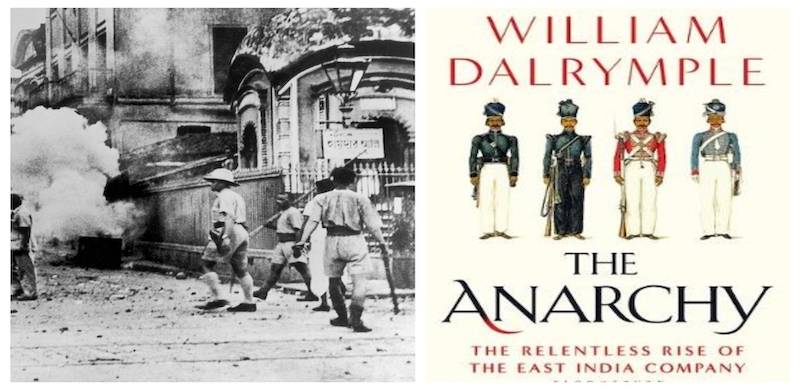
On 31st December 1600, the British monarchy assented to grant a group of 218 men a royal charter titled, ‘Governor and Company of Merchants of London trading to the East Indies’ by the virtue of which the company was bestowed with trading and traffic rights in all the region stretching from the Cape of Good Hope to the Strait of Magellan. This vaguely demarcated region was typical of other such ventures undertaken during the Rennaisance Period where every profitable piece of land was up for garbs—to be taken by the imperial thrones of Western Europe. The Anarchy by William Dalrymple sets out to make sense of the period that started with the EIC (East India Company) first trade expedition to Surat till the time when the Imperial Forces hounded the scions of the Martha Empire out of their strongholds in Pune in 1803. A period of unbounded savagery and incessant invasion that culminated in the ruination of India's standing as a regional (if not global) powerhouse.
William Dalrymple depicts rather gorily all the details of unbounded greed and butchery that transpired in Hindustan over two centuries. In the aftermath of several palace coups and invasions, he brings his readers to the limits of revulsion particularly with the detailed blood-curdling chronicles of the violence that was meted out to Shah Alam (Mughal Prince) and Ghulam Qadir Khan Rohilla (A Rohilla and a son of Delhi's Governor who was killed by Shah Alam).
The genius of Dalrymple lies in the scenic depiction of the various settings throughout his books. His account of the famished and scorched Bengal's corpse-ridden streets in the aftermath of the Bengal famine is especially bone-chilling. Similarly, the power of his pen comes into the full display when he is describing the besiegement of the grand forts of the Indian subcontinent. The Anarchy is not a revision of history but is a more personal and enriching account of the slow degeneration of East India Company into an unruly Leviathan taking place against the scenic backdrop of the carnage that dramatis personae including Nader Shah, Ahmed Shah Durrani, Shah Alam, Scindias and Holkars of Maratha Empire would unleash.
The Anarchy draws on the Dalyrmple's years of research conducted on the National Indian Archives, 'the company's voluminous miles of records', and the Persian accounts of contemporary writers, Mughal historians, and munishis, particularly Ghulam Hussain Khan and Khair ud Din Fakir whom the writer has credited with increasing his knowledge of that period by manifolds.
William Dalrymple sticks to his fact-driven narrative accounts of the period throughout the book. He often criticises the Company's directors and their underlings in the Hindustan for their acts of negligence in reining in small English merchants who were driving the local Hindustani merchants out of trade and hence out of means subsistence. Nonetheless, he shows particular poise and respect while describing William Hastings—the company's governor after the infamous Treaty of Allahabad was signed where the Diwani of the three provinces (Bihar, Orrisa, and Bengal) was relegated to the company.
Dalrymple describes Hastings as "plain-living, scholarly, diligent and austerely workaholic” who had “deep affection for India and Indians”, even downplaying the charges of corruption against Hastings when he was impeached for personal corruption in the House of Common.
Nevertheless, another figure of authority on the subject matter, Shashi Tharoor in his book An Era of Darkness: The British Empire in India has described Hastings as a bribe-taker whose "brazeness in such matters [bribe extraction] compels admiration: when he tortured and exacted every last ounce of treasure from the assets of the widowed Begums of Oude, Hastings duly informed the Council that he had received a ‘gift’ of 10 lakh rupees (£100,000 in those days, a considerable fortune) from the spoils…".
One particular aspect in which the book can revise history is in how it portrays the overzealous men like Tipu Sultan and Siraj ud Daula. Both of these men have been painted as the bulwarks against the juggernaut of British imperialism by Pakistani historians. The Anarchy has stultified the deification of both the Nabob of Bengal and Mysore. Both of the men have been described as haughty, vindictive, sadistic, and capriciously malevolent. Of the two, Siraj ud Daula has an especially shoddy reputation who out of his own stupidity alienated the banker family of Jagat Seths as well as his most senior generals whom he often treated with sheer disrespect. Thus, it was out of the Nawab's shenanigans that both the Seths and Mir Jafar abandoned him when he was faced by the British forces. Similarly, it was Tipu's own haughtiness that kept him from reaching out to the Marathas and Nizam of Hyderabad to ally. This move could have saved him from the defeat in the final Anglo-Mysore wars.
After the fall of Mysore, it was the Marthas who showed valiancy in putting a formidable defense as the last check on the British imperialistic endeavors within India. However, no sooner Tipu had died than the news of his demise reached Governor Lord Wellesley who raising a glass remarked, "Ladies and Gentlemen! I drink to the corpse of India." Mot juste for such a moment.
